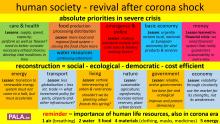Click to enlarge image
Corona forces societies to respond at lightning speed. Instantly the question arises how to tackle quickly and most intelligent the revival after the acute crisis. Because there are vital choices to be made, such as securing the vital basic economy.
Looking back to draw all the lessons
Since two world wars, linked by the deepest economic crisis of the 20th century, human society has never been under so much pressure.
It would be unforgivable not to know exactly what happened. Parliaments should investigate how the corona crisis has developed? What was the timeline of the known facts? And of decision-making? Why can't many wealthy countries do what Taiwan and South Korea can? It is utterly important to learn the lessons of corona.
How to revive human society after corona shock?
It’s crucial now to tackle the recovery wisely. We must make the best choices to revive society and our economy.
Remember that nothing is more important for humans than - in that order - air (breathing), water, food, materials (including medicines), energy.
So it seems that these are our priorities.
Secure the basic economy
An unbalanced globalization is causing adverse consequences, even insecurity: the supply of vital products such as mouth masks or respirators is not insured.
Counter this security risk by urgently recapturing autonomy - regional, national, European - for the basic economy of essential goods and services. Weave this ambition through all so-called recovery plans.
We have to eat every day
Suddenly almost everyone realizes that we have to eat every day. For that we depend upon a very long and much too intercontinental food chain of production, processing and distribution.
We have to recognise that this food system is dangerously vulnerable. Ensuring food every day requires many more local, regional and European food chains.
Develop vital medicines in time
The priorities of commercial pharmaceutical companies do not necessarily correspond to the greatest societal needs.
Governments, societies and research institutions will have to take much more initiative if we want to get the vital vaccines in time to fight pandemics. This also applies to antibiotics.
Money and sustainability
Money is a means, of course, but it is invaluable. It is the oxygen with which an economy manages to create prosperity and well-being. This process should be sustainable in all matters. For this we can’t rely upon a financial system that fails again and again to guarantee this sustainability. We urgently need (also) society and politics in the cockpit.
The transition to renewable energy must accelerate, not stop
The corona crisis seems to give some respite with regard to greenhouse gas emissions. But we soon risk an intensified climate crisis if the already slowing transition to renewable energy slows even more. The transition to a renewable energy system must not come to a halt, but must accelerate.
Many more questions
Can we have a fruitful exchange of views on the relationship and interweaving between urban and rural areas? Shouldn't we be planting urban forests this spring?
What investment policy for ports airports and other infrastructure when the world needs deglobalisation and less trade?
What is the fiscal basis for the reliable and active governments that are needed? With a tax system that is simple, fair and ecological?
How do we improve democracy so that it is both decisive and prepares the future for everyone? Plus, how do we protect democracy?
We still can shape our future
The sudden loss of so much grip on reality is annoying and confrontational.
It is equally true that we still can shape our future. Provided that we translate the best insights into clear choices and implement them rapidly and adequately. The quick response of health care and other sectors illustrates how much change is possible.
Dirk Barrez
Editor in chief pala.be


